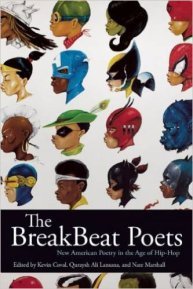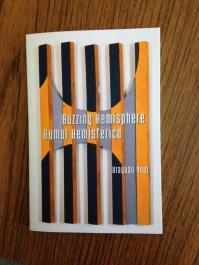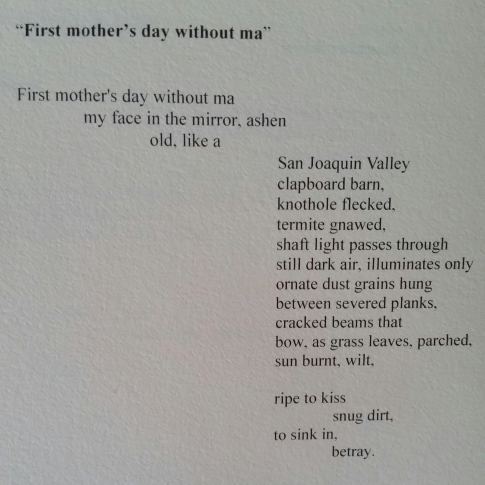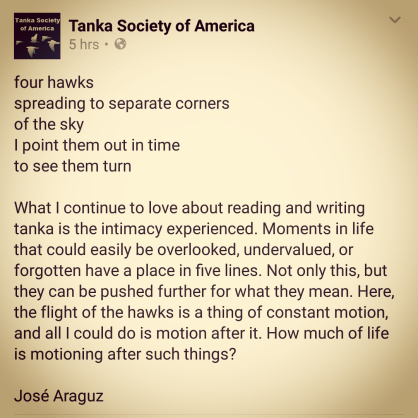Jose Angel Araguz's Blog, page 40
June 10, 2016
* twinklings & twinges: gwendolyn brooks
 This week, I had the opportunity to share and discuss excerpts from The Breakbeat Poets: New American Poetry in the Age of Hip-Hop with my intermediate composition class. Along with the poems, we also read some of the Ars Poeticas & Essays included in the anthology. Going between poems and prose allowed me to supplement the discussion with further insights into my own poetry literacy.
This week, I had the opportunity to share and discuss excerpts from The Breakbeat Poets: New American Poetry in the Age of Hip-Hop with my intermediate composition class. Along with the poems, we also read some of the Ars Poeticas & Essays included in the anthology. Going between poems and prose allowed me to supplement the discussion with further insights into my own poetry literacy.
The following excerpt from “Art, Artice, and Artifact” by Quraysh Ali Lansana, for example, has the poet discussing Gwendolyn Brooks and her attitude towards hip-hop:
Ms. Brooks possessed a guarded optimism toward hip-hop. She appreciated rap as poetry, or at least as lyric. But, she found most of the language unoriginal and the music mostly boisterous. Ms. Brooks never employed profanity in her work. She considered swear words a reflection of a poverty of ideas, which in turn would make most rap Fat Albert’s junkyard. However, as she shared in workshop, if there is no other word that will be as precise in communicating your concept, then use that word. She believed in “exactness” and her enduring poetry bears witness to this.
This anecdote prompted me to share this week’s poem, “The Bean Eaters,” as an example of what Lansana means when he talks of Brooks believing in “exactness.” It is the exactness of her phrasing as well as the details given of this couple’s world that make this poem the compelling work of art that it is. This exactness is present even at the level of sound; the pairing of “twinklings and twinges” strikes the exact note of bittersweet memory to move a reader to put this poem away in their heart.
The Bean Eaters – Gwendolyn Brooks
They eat beans mostly, this old yellow pair.
Dinner is a casual affair.
Plain chipware on a plain and creaking wood,
Tin flatware.
Two who are Mostly Good.
Two who have lived their day,
But keep on putting on their clothes
And putting things away.
And remembering …
Remembering, with twinklings and twinges,
As they lean over the beans in their rented back room that is full of beads and receipts and dolls and cloths, tobacco crumbs, vases and fringes.
*
Happy twinkling and twinging,
José


June 3, 2016
* mirroring & anthilling with garcía lorca
This week’s poem is a translation of a short lyric from Federico García Lorca’s Suite de los Espejos (Suite of the Mirrors). Reading through the suites, I was impressed again and again by García Lorca’s facility to estrange us from the everyday world, only to bring us back. His lyrics are infused with a purposeful sense of shock.
This particular poem hooked me in my first reading with its closing lines:
Me veo por los ocasos,
y un hormiguero de gente
anda por mi corazón.
(I see myself through the sunsets,
and an anthill of people
marches through my heart.)
Even in the brief space of three lines, this travel between something outside of human experience and something within it (in our very chests, to be exact) is enacted through the blended images of sunsets/anthill/people/heart. It’s something that moves beyond metaphor into an almost physical reaction while reading.
What fascinated my as I translated was the way the “mirror” theme of this specific suite leads up nicely to this ending. Through a series of questions with no answers, García Lorca develops a lyric uncertainty, only to push it further as the poem develops: …are you you / or am I me? the speaker asks, only to follow it up with a question regarding hands. It is to this physical point that the poem has led us: questions about the heart and thoughts and even stars have spiraled down to more intimate, physical terrain. With this set up, the poem tips into its final imagery as if tipped over by hand.

Confusion (from Suite of the Mirrors) – Federico García Lorca
translated by José Angel Araguz
My heart –
is it your heart?
And who reflects my thoughts?
Who lends me
this passion
without roots?
Why does my suit of colors
keep changing?
Everything is at a crossroads!
Why do you see in the sky
so many stars?
Brother, are you you
or am I me?
And these cold hands,
are they from that one?
I see myself through the sunsets,
and an anthill of people
marches through my heart.
*
Confusión (from Suite de los Espejos) – Federico García Lorca
Mi corazón
¿es tu corazón?
¿Quién me refleja pensamientos?
¿Quién me presta
esta pasión
sin raíces?
¿Por qué cambia mi traje
de colores?
¡Todo es encrucijada!
¿Por qué ves en el cielo
tanta estrella?
¿Hermano, eres tú
o soy yo?
¿Y estas manos tan frías
son de aquél?
Me veo por los ocasos,
y un hormiguero de gente
anda por mi corazón.
*
Happy espejando!
José


June 1, 2016
* new book review at the volta blog!
 Just a quick post to share my latest book review. This time around, I am review Urayoán Noel’s stellar book, Buzzing Hemisphere/Rumor Hemisférico.
Just a quick post to share my latest book review. This time around, I am review Urayoán Noel’s stellar book, Buzzing Hemisphere/Rumor Hemisférico.
To learn more about this talented, multi-platform poet, check out his site.
See you Friday!
José


May 27, 2016
* knocking around with kenyon & meyers
The Suitor – Jane Kenyon
We lie back to back. Curtains
lift and fall,
like the chest of someone sleeping.
Wind moves the leaves of the box elder;
they show all their light undersides,
turning all at once
like a school of fish.
Suddenly I understand that I am happy.
For months this feeling
has been coming closer, stopping
for short visits, like a timid suitor.
*
 In the poem above, I’m moved by the way things knock into each other in the scene described, and how that knocking mirrors how the poem is working structurally. The lyric momentum here swings between the three “likes” in the poem. Each one is a simile of life: a person sleeping, a school of fish, a timid suitor.
In the poem above, I’m moved by the way things knock into each other in the scene described, and how that knocking mirrors how the poem is working structurally. The lyric momentum here swings between the three “likes” in the poem. Each one is a simile of life: a person sleeping, a school of fish, a timid suitor.
The specificity of each, however, is what makes their presence move beyond image and metaphor. The whole poem moves through them: the suggested breath of “someone sleeping”knocks into the next line about the wind; the fish “turning all at once” turn in such a way that they knock like the mind of the speaker’s sudden understanding; and then the ending pushes things into a further understanding of silence and resilience.
This short lyric brought to mind this haiku by Bert Meyers:
I can only laugh
when my daughter spreads her arms
to catch the cold wind
Both poems, for me, reflect a bit of what this time of year feels like. May is like a hinge between spring and summer, and you can hear the seasons’ doors creaking on the leaves.
Happy creaking!
José


May 20, 2016
* surging with angela narciso torres
Reading through Angela Narciso Torres’s poetry collection Blood Orange, I was moved again and again by the way moments of attention and detail are hinged in such way to the line as to create a visceral reaction, a blur of image and meaning that shifts the act of reading poetry beyond merely running eyes over text.
In this week’s poem, “Ironing Woman,” the memory of being with someone as they work is delivered in rich, physical detail. What makes the details sing is how the poet handles the pacing throughout. There is a move repeated between stanza breaks, for example, that is later followed through the poem’s final image. The broken sentence at the end of the first stanza delivers its wisdom via white space and suspense; white space enters again between the second and third stanza to let the word “Slowly” linger in the reader’s mind so that the movement between the image before and the image after carry significant weight and presence. This movement of presence and resonance comes to a stunning flourish in the final image, which moves from the interior of the room to an image of ” a gull’s shadow / over the surging sea.”
This final image of shadow tied strictly to the sea mirrors the ironing woman’s stare and delivers the reality of how work ties itself to who we are, whether through physical or psychic memory.

Ironing Woman – Angela Narciso Torres
Afternoons I’d lie on her woven mat
of lemongrass and burnt leaves,
listening to tales of spurned love
on her bright-yellow transistor radio.
From her I learned what the old wives knew —
never to wash after ironing. Propelling
the gleaming prow across the ripples
of my father’s shirt, she’d tell how the iron
gnarled her wrists, once smooth as bamboo.
How the steaming metal twisted
her veins, brought on “the shakes.”
When I saw the serpentine rivers
on her arms, I knew this was true. Slowly
she’d raise both hands to show how
they trembled like maidenhair ferns
before a storm. Turning to her work,
her eyes reclaimed their stare
as though tracing a gull’s shadow
over the surging sea.
*
Happy surging!
José


May 13, 2016
* unhatched with colette jonopulos
Once the realization is accepted that even between the closest human beings infinite distances continue, a wonderful living side by side can grow, if they succeed in loving the distance between them which makes it possible for each to see the other whole against the sky.
(Rainer Maria Rilke)

This quote by Rilke serves as an epigraph at the beginning of Colette Jonopulos’s chapbook, Between. Reading through the poems in this chapbook, I was moved how each reflected a bit of what Rilke’s words point to, how distance can be used to see something and/or someone clearer.
I share the title poem below as an example not only of the above theme but also of a short lyric able to evoke and engage via images and phrasing. While the address to a “you” creates the air of intimacy, the meditation on the image of bird eggs evokes Rilke’s “infinite distances.” From this angle, a couple is always a “you” and an “I” (you/I), and their relationship “the fragile membrane between” them.
The ending on “hatchlings” equates unspoken words to unborn birds, a pairing that, beyond rhyme, hits home for the life waiting in both words and birds to come.
Between – Colette Jonopulos
To give you a handful of
birds still in their shells, blue
shells and slate grey, thick
shells of protection, like the
ones we’ve built up with our
silences.
What was easy has
become the gracious and
cold considered other,
boundaries set; we are
not the content or container,
but the fragile membrane
between.
As the plane lands, as I
walk into still another
strange city, I’ve saved
the shells unbroken,
inside are words I
have not said,
slick and breathless
hatchlings.
*
Happy hatching!
José


May 9, 2016
* new work up at star 82 review!
Just a quick post to announce the release of Star 82’s Special Flash Issue which includes my piece “Prayer Box” along with an original ink sketch!
This special issue consists of 50 poets writing flash pieces of exactly 5o words each. Stellar work by Todd Mercer, Kate K Lore, and Autumn Stephens among others are included. Check out the rest of the issue here.
Special thanks to editor Alisa Golden for putting together a great issue and for allowing us to share original artwork!
See you Friday!
José


May 6, 2016
* tom murphy & moving adelante

The poem above comes from Tom Murphy’s chapbook horizon to horizon. One of the things I’m moved by in the poem is the way the form mimics the conceptual space the speaker is contemplating. Standing before the mirror on the “First mother’s day without ma,” the speaker positions themselves in a new place, a blank page of sorts. What follows then is the completion of a simile started on one side of the page/mirror, a simile that finds the speaker detailing into “gnawed” and “cracked” imagery, feeling age as sunlight through a “clapboard barn,” as well as feeling it down to the earth. From new awareness to the complicated meaning of awareness, this lands on the page in a visceral way.
*
I want to say a thank you to everyone for their kind words and good wishes in regards to the news of my second poetry collection, Small Fires, being accepted for publication by FutureCycle Press. The tentative release date is May 2017.
To further celebrate, here is a poem from the upcoming book (originally published in Luna Luna Magazine). I share it specifically because, as with Tom’s poem above, it takes on the theme of mothers and their impact on our lives. My own mother’s story is one of survival and persistence. One of her favorite words in our talks is adelante, a fact that I’m forever charmed by given that the word contains her name within.
Quinceañera – José Angel Araguz
The women of the house shook her from sleep,
and began to serenade, trying to mark
the air of another rite that seemed to come
too soon, the song her father should have sung
instead of barking, running her off, a song
with the momentum of a hand ready to skip
a stone across water, a hand which would
fall away soon as the song was done,
but not before a stone danced,
lifting and lifting off the face of water,
each time as if it’d never drop – past midnight,
the women sang, without ceremony,
without food, without a sense of how
to ready a girl to skip into the current
of her life, could only sing,
their voices cracked and strained, trying
not to wake her son who slept beside her,
a son who would grow up and dream of the night
these voices broke the air and raised a song
for the little girl his mother was,
for the woman she now had to become.
*
Happy becoming!
José


May 4, 2016
* sharing some news & some tanka!
Just a quick post to officially announce that my second full length collection of poetry, Small Fires, has just been accepted for publication in 2017 from FutureCycle Press. This collection will feature the poems “Joe” and “El Rio” among others.
FutureCycle are also the same good people who published my prose poem/flash fiction chapbook, Reasons (not) to Dance. I’m excited to be working with them again. Stay tuned for further news come 2017.
To celebrate the Small Fires news, I thought I’d share my contribution to the Journeys into Tanka project that’s going on via the Tanka Society of America Facebook page. Poets were asked to share a tanka as well as some words on their journey into the form, what it means for them and how. Readers are welcome to respond in the comments with their own tanka and/or tanka-related prose.
Special thanks to Marilyn Hazelton, TSA president and editor of red lights, for the invitation to contribute!

See you Friday!
José


April 29, 2016
* leaving with cavafy
One Night – C. P. Cavafy
The room was cheap and sordid,
hidden above the suspect taverna.
From the window you could see the alley,
dirty and narrow. From below
came the voices of workmen
playing cards, enjoying themselves.
And there on that common, humble bed
I had love’s body, had those intoxicating lips,
red and sensual,
red lips of such intoxication
that now as I write, after so many years,
in my lonely house, I’m drunk with passion again.
translated by Edmund Keeley/Philip Sherrard
 Continuing in the short lyric vein of last week’s post, the poem above handles several worlds in twelve quick lines. I’m moved by the pace of the poem. The first stanza sets the tone of the outside world, a world dark, “dirty and narrow.” Then the second stanza opens up the world of tryst and memory. If, as Jürgen Becker says, “The memory does not exist, you have to create them,” then Cavafy creates a memory of “intoxication” and “passion” that is as alive in the speaker’s present as it was in his past. This turning over of thought and confession makes of memory a talisman against a “lonely house.”
Continuing in the short lyric vein of last week’s post, the poem above handles several worlds in twelve quick lines. I’m moved by the pace of the poem. The first stanza sets the tone of the outside world, a world dark, “dirty and narrow.” Then the second stanza opens up the world of tryst and memory. If, as Jürgen Becker says, “The memory does not exist, you have to create them,” then Cavafy creates a memory of “intoxication” and “passion” that is as alive in the speaker’s present as it was in his past. This turning over of thought and confession makes of memory a talisman against a “lonely house.”
Thinking up possible poems to share this week I was suprised to find that I hadn’t shared any poems by Cavafy. To make up for that, I also share “Ithaca” below. Its incorporation of Homer’s Odyssey into an allegory for living with awareness (or, in another light, a reflection of the adage: Life is a journey, not a destination) ranks highly with me on a personal level. I read the poem first in my early twenties, at a time when I was headstrong on purpose. Poems like this one guided me toward slowing down.
 Cavafy’s poem also brings to mind Tennyson’s “Ulysses,” another poem incorporating the story of the Odyssey. The following lines from “Ulysses” compliment the spirit of the above short lyric in their human/emotional momentum:
Cavafy’s poem also brings to mind Tennyson’s “Ulysses,” another poem incorporating the story of the Odyssey. The following lines from “Ulysses” compliment the spirit of the above short lyric in their human/emotional momentum:
I am a part of all that I have met;
Yet all experience is an arch wherethro’
Gleams that untravell’d world whose margin fades
For ever and forever when I move.
Leaving Texas, and then learning to leave other places after that, I worried I carried little along with me inside. Poems like these showed me otherwise.
Ithaca – C. P. Cavafy
As you set out on the way to Ithaca
hope that the road is a long one,
filled with adventures, filled with understanding.
The Laestrygonians and the Cyclopes,
Poseidon in his anger: do not fear them,
you’ll never come across them on your way
as long as your mind stays aloft, and a choice
emotion touches your spirit and your body.
The Laestrygonians and the Cyclopes,
savage Poseidon; you’ll not encounter them
unless you carry them within your soul,
unless your soul sets them up before you.
Hope that the road is a long one.
Many may the summer mornings be
when—with what pleasure, with what joy—
you first put in to harbors new to your eyes;
may you stop at Phoenician trading posts
and there acquire fine goods:
mother-of-pearl and coral, amber and ebony,
and heady perfumes of every kind:
as many heady perfumes as you can.
To many Egyptian cities may you go
so you may learn, and go on learning, from their sages.
Always keep Ithaca in your mind;
to reach her is your destiny.
But do not rush your journey in the least.
Better that it last for many years;
that you drop anchor at the island an old man,
rich with all you’ve gotten on the way,
not expecting Ithaca to make you rich.
Ithaca gave to you the beautiful journey;
without her you’d not have set upon the road.
But she has nothing left to give you any more.
And if you find her poor, Ithaca did not deceive you.
As wise as you’ll have become, with so much experience,
you’ll have understood, by then, what these Ithacas mean.
translated by Daniel Mendelsohn
*
Happy Ithaca-ing!
José





